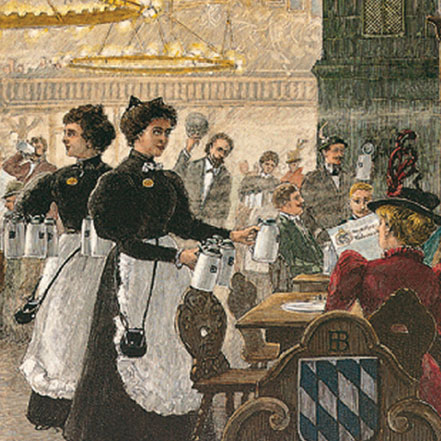
Celina Rieger Horsley, marketing consultant for Hofbräuhaus of America, recently shared Hofbräuhaus’ 400-year history and its importance to the renowned brand. By Cindy Charette
Celina Rieger Horsley, marketing consultant for Hofbräuhaus of America, recently shared Hofbräuhaus’ 400-year history and its importance to the renowned brand.
What can you tell us about Hofbräuhaus’ history, which goes back over 400 years?
It’s 1589, and it all started with the need for better beer. Munich locals were dissatisfied with the quality of beer served at that time, so Duke Wilhelm V decided to put an end to the complaints by founding the ducal Hofbräuhaus in Munich. He had sent for Heimeran Pongratz, a monk from the Benedictine monastery Geisenfeld, who became the brewery’s planner, builder and first master brewer. At the ducal brewery, which has since become the most famous beer hall in the world, people from all aspects of life come together to enjoy Bavarian hospitality.
How does this history help with the brand’s success?
A call for better beer and hiring the best of their craft are two significant factors that have driven the brand to where it is today. Franchisees of a franchise concept like the brew pub benefit not only from the brand’s profound knowledge in brewing premium quality beers after the original recipes but also from the roots and brand’s foundation of serving the people!
The original Hofbräuhaus in Munich also serves as an architectural flagship for all Hofbräuhaus of America franchise brew pub and large restaurant locations, with its beer hall and long Stammtisch tables made to gather.
In what way does the brand showcase this important history?
Once ducal, then royal and now state-owned, the brewery has had many forms of leadership but all were far from your conventional brewery and franchise business. With the direct tie to political changes and historical events, the brand is shaped into what it is today.
Take the Oktoberfest, for example, which originated from a wedding celebration for crown prince Ludwig of Bavaria and his Therese of Sachsen-Hildburghausen in 1810 and has since become a yearly tradition and a substantial element of the Hofbräu brand. With that, Hofbräuhaus of America franchisees are given a huge point-of-sale opportunity enriched by the brand’s authenticity compared to other competitors.
Cindy Charette

